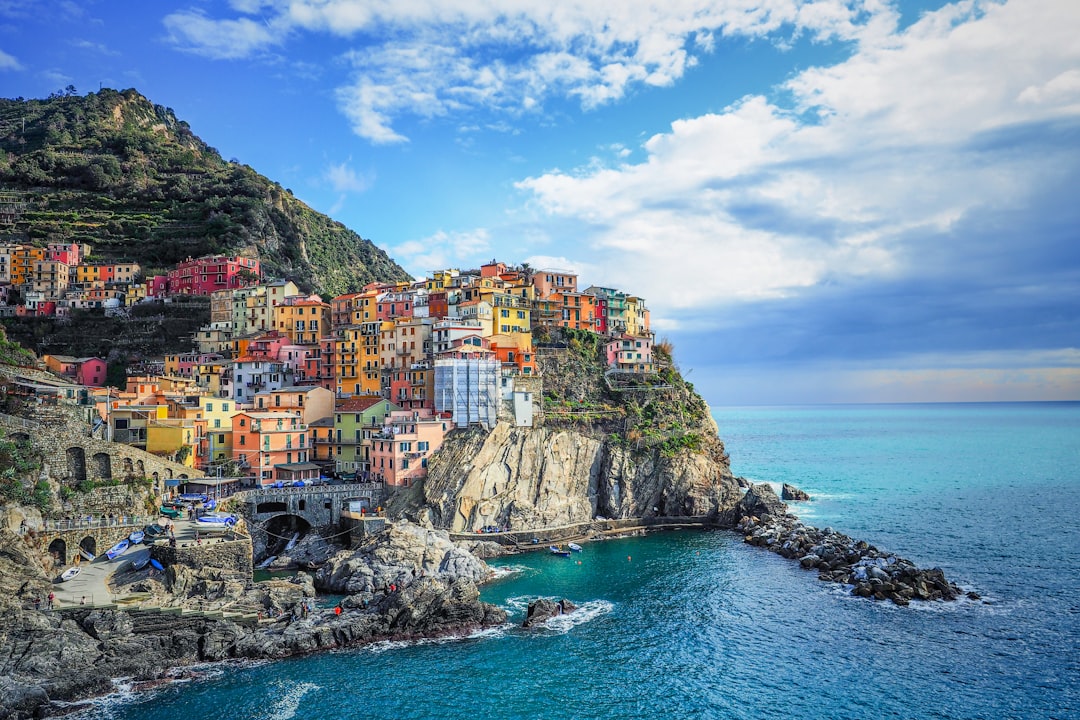Readers are likely aware that, from time to time, I enjoy writing posts about life lessons (for example, from Florence, Venice, knitting, photography, and even asparagus). This week’s post was supposed to be Life Lessons from Cinque Terre. My husband and I had planned to spend our spring break in Italy—taking a little tootle to Turin (of shroud fame) for Easter weekend and then continuing on to Cinque Terre for several days of hiking and basking in the sun with a glass of wine (me) or cup of gelato (my husband).

But, as the saying goes, we plan, and God laughs. This is the second time our trip to Cinque Terre has been thwarted; we had originally planned to go to Cinque Terre for the first week of April 2020. Readers can imagine how well that turned out. This time around, the evening before we were set to leave, our dogsitter, Catherine, called to tell us that our dog, Lynn, had suddenly become seriously ill. So instead of hiking and basking and drinking, here we are, stuck at home.1
Which reminds me of a joke:
Two old folks, Clarence and Gladys, are sitting on a park bench in their tiny town, way out in the sticks. Gladys sighs and says, “I want to go to Paris again.” Amazed, Clarence asks, “You’ve been to Paris before?!” “No,” Gladys replies, “but I’ve wanted to go before.”
I recognize that it is a bit odd to talk about life lessons from not going to Cinque Terre; apart from the couple thousand people who live or work there and the couple million (!) people who visit every year, for everyone else in the world, not going to Cinque Terre is just normal life. It’s like the challenge my daughter issued when she was in preschool: “Pretend you have a grape in front of your face. Now pretend you don’t have a grape in front of your face.” So, just act like normal? Consider it done! Anyway, in the spirit of pretending I don’t have a grape in front of my face, here are some life lessons I learned from not going to Cinque Terre.
“Good luck and bad luck are all mixed up”
One of my favorite stories, beautifully told by Jon J Muth in his book Zen Shorts, is “The Farmer’s Luck”:
A farmer’s horse runs away. “Such bad luck!” say the neighbors. “Maybe,” replies the farmer. The next day, the horse comes back, and he has brought two wild horses with him. “Such good luck!” say the neighbors. “Maybe,” replies the farmer. The next day, the farmer’s son, while trying to tame the wild horses, is thrown and breaks his leg. “Such bad luck!” say the neighbors. “Maybe,” replies the farmer. The next day, recruiters arrive to take all the young men away to war, but because the son’s leg is broken, he is spared. “Such good luck!” say the neighbors. “Maybe,” replies the farmer.
We can see this story working in our own lives. Last week, our version of “The Farmer’s Luck” went like this: On Friday afternoon, we learned that our son, who had been waiting several weeks to hear about a terrific job he really wanted, got the job offer. Such good luck! Maybe. While we were still celebrating our son’s good news, Catherine called to tell us that Lynn was running a 41C/106F fever and was unresponsive. We had to cancel our trip to Italy and check Lynn into the animal hospital. Such bad luck! Maybe. After two days in the hospital, Lynn was feeling much better2 and was able to come home. Such good luck! Maybe. But by then it was too late to rebook our trip. Such bad luck! Maybe. But we were able to spend the vacation hanging out with friends and hiking and basking right here at home. Such good luck! Maybe.

The moral of the story? As with spring weather so too with luck: If we don’t like the way things are now, wait a minute or two and it will change. Or, put another way, there is no good luck or bad luck. There is only what happens and how we choose to respond to it.
Beware False Economies
A false economy is anything you do that saves you money right now but costs more in the long run—for example, buying a junky car because it’s cheap but getting hit with ruinous repair bills down the road. We experienced an expensive false economy during our foiled vacation debacle. I had felt very clever back in February when I booked our hotel room in Turin, because I had chosen the prepaid option to get a 25 percent discount. Readers, do not be seduced by the siren song of the prepaid discount! Turns out that when you cancel at the last minute, the hotel doesn’t refund your money, even when you ask nicely, and even when you have a really good reason for canceling. That money is just gone. Grr. So irksome!
To illustrate another potential false economy, let me invoke the wonderfully silly kids’ book Something Good, by Robert Munsch. Tyya and her brother accompany their dad to the grocery store and beg him for “something good” (meaning junk food, which they keep squirreling away in the cart). Tyya is such a pest that her fed-up dad parks her next to a display of dolls and orders her to wait there and NOT MOVE. Tyya stands so still that a worker thinks she is a doll and puts a price tag of $29.95 on her. (Told you it was silly!) At the checkout, the cashier tries to charge Tyya’s dad $29.95 to take her out of the store. The dad argues with the cashier until Tyya asks, plaintively, “Daddy, don’t you think I’m worth $29.95?” And Tyya’s dad ponies up.
So it turns out that when your dog gets deathly ill over Easter weekend, her regular vet will be closed, and she will need to go to the extra-special, extra-pricey Tiernotfallklinik (animal emergency clinic). Now factor in that this is in Switzerland, where everything (except, for some mysterious and lucky reason, alcoholic beverages) costs more than it does in the US.3 Suffice it to say that we wound up paying more to resurrect Lynn than we would have paid for our whole Italy trip. But refusing to save Lynn’s life because of the cost was totally out of the question and would have been the falsest of economies. Our beloved animal buddies are worth it!

“More happy love! more happy, happy love!”
I know, I know, Keats, in his “Ode on a Grecian Urn,” intended this line to be ironic, or at least poignant, speaking as he is of figures frozen on a funerary urn. But in our lives and our interactions with other beings—be they human or animal—there should be no limit to love. Our culture has a destructive tendency to prefer a sarcastic, distant, hipster affect to warmth and sincerity. We lionize those who are the first to mock, the quickest with the dismissive one-liner, the last to express true feelings. It is as though we believe that every relationship is a contest—call it emotional chicken—in which the first person to show s/he cares is the loser.
But really, the people who hold themselves apart from human connection are the losers. Being stingy with our feelings, praise, gratitude, and kindness is another false economy. Snarky and aloof people may garner our admiration for very little emotional investment in the short term, but in the long run their social lives will be impoverished. No one regrets on their deathbed that they had too many loving relationships. The lone wolf might be a cool cat, but s/he is also in a cage of other people’s opinions.4 (Plus, lone wolves are not particularly wolf-like, given that wolves are pack animals.) When we feel a kind or generous impulse, we should not stifle it; we should not ask ourselves, Is this appropriate? Is it embarrassing that I feel this way? Will other people think I’m weird? We should free ourselves to express that feeling openly, confident that we will be rewarded with richer relationships.
Catherine and her husband, Roger, love Lynn like she is their own dog and have welcomed her into their home and family. Their kids help to care for Lynn, and their daughter sometimes borrows her for the weekend. They take Lynn along with them to their holiday cottage in the mountains; Lynn even appears in the family photo album.

When Lynn got sick, Catherine didn’t think, “Oh well, she’s just a dog” or “Well, she’s not MY dog.” She did not constrain her love. She and Roger interrupted their holiday to drive Lynn over a winding mountain pass to the animal hospital on the other side. They waited with us at the hospital until Lynn was stabilized, and while we waited Catherine and I sat next to Lynn on the floor, petting her and comforting her. During the following week, Catherine checked in every day to see how Lynn was doing.
Readers, I’d like to issue a challenge that is almost as easy as pretending you don’t have a grape in front of your face. If there is someone in your life whom you care about but who might not know it, go ahead and tell them how you feel, and why—or show them through your actions, as Catherine and Roger did for Lynn. Don’t worry that you might feel awkward, or that you might seem needy or nerdy. You won’t. Your loved one will be grateful, and I predict that they will send the love right back to you.
How about you, readers? Have your plans ever been thwarted? What did you learn from the experience? Did anything good come of it? And did you take me up on my challenge to tell someone you care about them? What happened? Please share your thoughts in the comments!
The Tidbit
Let’s say you are a good planner and also thrifty and reluctant to waste anything. In the days leading up to a vacation you always plan meals that will use up perishables so that you won’t have to throw away food before you leave. Let’s say that you take great pride in your nearly empty fridge. Now let’s say that that vacation is called off at the last minute for some reason, and it’s too late to run to the store for new supplies. You still have to cook dinner, and that empty fridge isn’t looking so clever anymore. Pasta puttanesca to the rescue! (And, apropos Cinque Terre, the traditional pasta puttanesca recipe features anchovies, which are a celebrated product of the Ligurian region of Italy, and of Cinque Terre in particular.)
Pasta puttanesca is a simple dish you can make using only items found in the pantry. The name means “pasta in the style of a prostitute.” There are multiple explanations for the name out there. The sentimental version is that as the ladies of the evening cooked the sauce, the tempting aromas would waft out onto the street to attract customers.5 The pragmatic version is that the sauce is quick to make, so the ladies could prepare it between clients. The historical version is that in the past, Italian custom forbade prostitutes to shop when “decent” women were out and about, and so they were allocated only one day per week for their shopping. They thus had to rely on pantry items for their dishes. Finally, a grad-school friend has an R-rated explanation: “It’s a salty fishy sauce! Seems appropriate.” Ahem. I’ll just leave that there for your edification. On to the recipe!
Pasta Puttanesca
Ingredients
1/4c olive oil
1/2 a small onion, finely diced
1 clove garlic, finely minced with 1/2tsp salt to make a paste
plenty of chopped fresh rosemary (if you have it; otherwise 1tsp dried rosemary is fine)
red pepper flakes, freshly ground black pepper, and dried oregano to taste
2–4 anchovy filets, soaked for half an hour in whole milk, rinsed, and chopped (Note: I omit the anchovies to make the recipe vegetarian)
2T sun-dried tomato paste (or regular tomato paste is fine too)
1 15oz/400gm can diced tomatoes
1/4c capers, coarsely chopped
about 15–20 Kalamata olives (to taste), pitted and coarsely chopped
8oz/500gm rotini pasta (or any shape that is good at grabbing lots of sauce)
Method
Heat a large pot of salted water to boiling.
Meanwhile, heat the oil in a large skillet and sauté the onion. Sprinkle a bit of salt over the onion to help it purge its juices. Don’t let the onion brown.
Add in the garlic, herbs, and spices and sauté briefly. Don’t let the garlic brown.
Add in the anchovies (if using) and tomato paste and sauté, stirring constantly, until everything becomes a savory paste.
Dump in the canned tomatoes, capers, and olives, stir, and heat to a low simmer.
When the water is boiling, cook the pasta until it is just short of al dente, scoop out a ladleful of the pasta water, and add it to the sauce.
Drain the pasta and dump it into the sauce, briefly cook, stirring constantly, until the pasta absorbs a bit of the sauce, and serve immediately.
My husband jokes that this week I should call myself the Unhappy Wanderer, or, alternately, the Happy Non-Wanderer.
Did you know that the way a vet brings down an animal’s fever is to put her on an IV and infuse chilled saline solution into her blood? Amazing!
For example, a medium-sized cheese pizza usually costs at least $20.
In honor of Lynn, I peppered this piece with, by my count, six animal metaphors. See if you can find them all!
Just between us, I don’t think food is what attracted the customers, actually.




I'm glad your dog is doing well!
Hey Mari, I hope Lynn is recovering well!
I've done the "saving" money on a non-cancellable hotel thing myself - in my case it was snow disrupting the transport system for almost a week that got in the way. This was, needless to say, not in Switzerland.